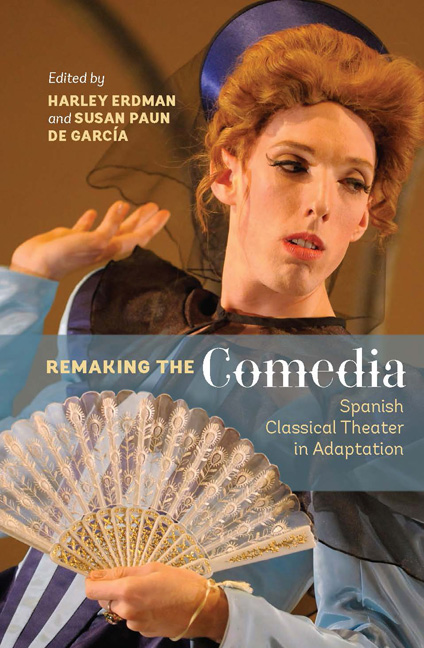Book contents
- Frontmatter
- Contents
- Illustrations
- Contributors
- Preface
- Note to the Reader
- Acknowledgements
- PART I THEORIZING
- PART II SURVEYING
- PART III SPOTLIGHTING
- 11 The Dog in the Manger: The Continuum of Transformation
- 12 El caballero de Olmedo: Los Barracos's Baroque Gentleman
- 13 Corpus Lorqui: Transformation and Transubstantiation in Los Barracos de Federico’s El caballero de Olmedo
- 14 The Phoenix of Madrid: Calderón's No hay burlas con el amor Reborn in Bath
- 15 A Prince in Pittsburgh: “Recasting” a Contemporary Staging of The Constant Prince
- 16 Directing Marta the Divine: Provocative Choices in the Service of the Story
- 17 The Dramaturgy of Absence: Minding the Gaps in Tirso de Molina, Ana Caro, and Feliciana Enríquez
- 18 Translations and Transgressions: Twenty-First-Century Questions Regarding Zayas
- 19 Comedia Actresses, Then and Now: The Case of Ana Caro's Valor, agravio y mujer
- 20 “Kinesthetic Empathy” and the Comedia refundición
- PART IV SHIFTING
- Play Titles Cited
- Works Cited
- Index
18 - Translations and Transgressions: Twenty-First-Century Questions Regarding Zayas
from PART III - SPOTLIGHTING
Published online by Cambridge University Press: 05 December 2015
- Frontmatter
- Contents
- Illustrations
- Contributors
- Preface
- Note to the Reader
- Acknowledgements
- PART I THEORIZING
- PART II SURVEYING
- PART III SPOTLIGHTING
- 11 The Dog in the Manger: The Continuum of Transformation
- 12 El caballero de Olmedo: Los Barracos's Baroque Gentleman
- 13 Corpus Lorqui: Transformation and Transubstantiation in Los Barracos de Federico’s El caballero de Olmedo
- 14 The Phoenix of Madrid: Calderón's No hay burlas con el amor Reborn in Bath
- 15 A Prince in Pittsburgh: “Recasting” a Contemporary Staging of The Constant Prince
- 16 Directing Marta the Divine: Provocative Choices in the Service of the Story
- 17 The Dramaturgy of Absence: Minding the Gaps in Tirso de Molina, Ana Caro, and Feliciana Enríquez
- 18 Translations and Transgressions: Twenty-First-Century Questions Regarding Zayas
- 19 Comedia Actresses, Then and Now: The Case of Ana Caro's Valor, agravio y mujer
- 20 “Kinesthetic Empathy” and the Comedia refundición
- PART IV SHIFTING
- Play Titles Cited
- Works Cited
- Index
Summary
I believe that as performing artists we translate and interpret the Spanish Golden Age according to our own twenty-first-century values. In approaching a Golden Age play, one cannot successfully create a museum piece that replicates how the play was performed in its time, but one must create a piece that speaks to the contemporary age. In addition to the practicalities of casting, blocking, character development, and rhythmically pacing the show, the director engages in a re-conceptualization through an understanding of the original cultural moment from which the play emerged and the current cultural moment with which the director is engaged. Faced with a radically different language and structure from the original text, a radically different socio-political order, and in a radically different country, what is the director to do? One must translate or adapt the vision for our generation. As the director, my re-imagining of Friendship Betrayed by María de Zayas is reflected in the production's concept, language, casting, gender, staging, costumes, and set.
I have been enthralled by the plays of the Spanish Golden Age since graduate school, and in the ensuing years I remained captivated by the plays of that era. While I was teaching theater at Georgetown University, a friend and collaborator from the Spanish Department, Dr. Barbara Mujica, at that time president of the Association for Hispanic Classical Theater (AhCT), made me aware of a marvelous new translation of María de Zayas's Friendship Betrayed that would be perfect for my theater company, Washington Women in Theatre (WWIT). It has been important for me, as co-founder and artistic director of WWIT, to bring the woman's voice to the forefront; we are still, in large part, missing the woman's voice in theater. I was also drawn to this play because, as Elizabeth Howe notes, “female characters dominate the action” (148). Moreover, gender, sex, and power are themes I have explored as a director over the years.
- Type
- Chapter
- Information
- Remaking the ComediaSpanish Classical Theater in Adaptation, pp. 177 - 188Publisher: Boydell & BrewerPrint publication year: 2015



